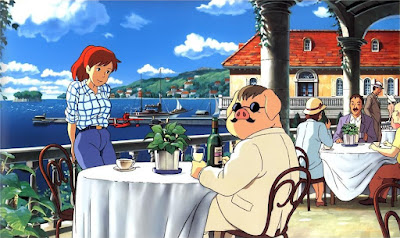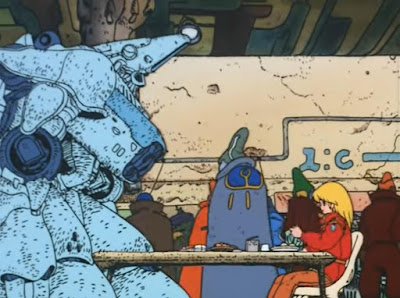Director: Hayao Miyazaki
Screenplay: Hayao Miyazaki
Based on a manga by Hayao
Miyazaki
Voice Cast: Shuuichirou Moriyama
as Porco Rosso; Akemi Okamura as Fio; Akio Ohtsuka as Curtis; Tokiko Kato as
Madame Gina; Hiroko Seki as Gramma; Sanshi Katsura as Old Man Piccolo
Viewed in Japanese with English Subtitles
As someone who has stayed away from Studio Ghibli films, merely because I had not gotten around to these productions, it is still with a delight when I finally get to titles once and a while, able to see a film like Porco Rosso for the first time and arguably with a greater impact. There is less built up expectations as a result of how I have gotten to them, and Porco Rosso is fascinating from the get-go as I had a complete misassumption about the premise, based on a manga by Hayao Miyazaki with his love of planes and aviation, believing it was set during a war or was like an Indiana Jones adventure with more aerial dog fighting. What you get instead is still sweet with sombreness, with the lead a war veteran with the head of a pig, but is set in Italy after World War I. Despite being a light hearted work, it still evokes future real events as the eventual growth of fascism is explicitly detailed, the era of Benito Mussolini, even in this family friendly tale. This undercutting of the presumption I had was an added positive as, whilst having expected a war-set adventure story would have still been great, knowing Miyazaki's talent, the switch to a more playful but mature tale of aeronautics and love was a rewarding investment.
Saying Porco Rosso was great feels redundant, definitely not to waylay to the end of the review. This film does emphasis, despite his status for very popular crowd pleasing animated films, Hayao Miyazaki's position as a very adult filmmaker. Despite the reputation for a film like My Neighbour Totoro (1988), Miyazaki the man from his dour outlook to the times he has effectively retired, is an elder statesman, makes him very complex to view, someone who is simplified to the West in appearance both as a man (if you take into his very complicated relationship to his son Goro) to the films' themes as an auteur himself. Porco Rosso the titular character definitely feels like the lead of a film closest to Miyazaki himself. A grumpy but ultimately passionate figure, Porco Rosso is an outsider who, due to a curse never explicitly brought up in exposition or the narrative, has a pig head. The idealist younger man in flashbacks became a dashing and heroic older figure still, closer to middle age, but he hides on his desert beach on an island and leaves when paid to deal with sky plane pirates. Considering this character, even if wholesome, we undersell and simplify Miyazaki here in the West completely, and Porco Rosso's biggest virtue is how, in what is a slight story signposted around a growing rivalry with a hot headed American pilot named Curtis, this really has a lot a complexity in its heart.
The production of the film, during the outbreak of war in former Yugoslavia, clearly took on a different tone due to this reality outside. Originally meant to be a short funded by Japan Airlines, this however is a personal film, with the clear love and loving reinterpretation of bi-planes onscreen exquisite, but with mind to the consequences of conflict and politics. The setting is poignant, set between the twenties to thirties of Italy, its one eccentric touch of having a lead cursed with a pig's head more symbolic in hindsight, a plot point to being a defensive barrier from him and the world, including a woman from his childhood called Madame Gina who still pines for him in love, even if calm in her demeanour whilst others fall for her. The film is mostly fun in tone, set up immediately when Rosso, in his trademark red plane, has to deal with a motley crew of sea plane pirates having kidnapped a school of young girls, all of whom far more fascinating and excited by their predicament then scared.
The balance between humour, adventure and sombreness is a deft and perfect balance here. I admit my interest in Studio Ghibli over the years was more for Isao Takahata, a real underdog, but Miyazaki here has a complex film in mood and tone. The real setting is a surprise, in that all of this is set in a tremulous time in Europe where a growing ominous wave would eventually crossover. Porco Rosso never becomes bleak, but a weight is felt in how Rosso, a former WWI veteran, is part of a group of free people - mercenaries, sky pirates with hearts of gold - who will be outlawed and challenged, as a friend of his time from the war era comes to him to try to get him hired as part of the government's sponsored air force. Nowadays a film for a family audience would be called propaganda if the lead actually said "Better to be a pig than a fascist", and it is amazing to think we can turn to a line like this from an anime film as a needed motto to actually quote in the decades that have passed. Knowing the influence of the conflict in Yugoslavia at the time, which influenced a variety of films including Theo Angelopoulos' Ulysses' Gaze (1995) reflecting on the war, really makes a lot more sense of this film's more serious aspects fully now.
Even in the more light-hearted content, you see much politics and/or social comment in just how, needing his plane to be rebuilt, Rosso ends up with all the women of a town, where all the men have left for work, working on the machine as the film also introduces Fio. Continuing Miyazaki's strong hand for interesting female characters, the granddaughter of the designer called Fio is a really good character and a really nice introduction midway through the film. To Rosso, the world weary and cynical older pilot, the clichés of a more wide eyed and optimistic figure, a seventeen year old girl with a talent for aerial engineering and being outspoken, is when a cliché works entirely, a nice shot in the arm for the film. This does not talk down to viewers, children or adults, as a film which is a constant through its director's work, of a man who lives outside of society, with Fio the figure whose worldview brings what he treasures more upfront in his admiration for her. Even the sky pirates are eventually revealed to be noble when forced to, living in a world setting which here as in real life is becoming poisoned by the fascism of later, with them all who are truly free having to survive the growing change after the film ends. The surprise this did not take the route of a war film or Indiana Jones does bring a great deal of additional meaning for me now having seen what the movie is.
Instead of all things, this has an ending similar to John Ford's The Quiet Man (1952). Ford, a legendary American filmmaker known for many films but especially in Westerns, had ultimately a heartfelt attitude to life which The Quiet Man exemplified, where John Wayne as a man of Irish descent comes to Ireland to find himself. It is a film where a bitter rivalry with another male character is resolved in a prolonged fistfight to a huge crowd and friendship. That could be considered a spoiler for Porco Rosso, but ultimately it is not, as the figure of Curtis is not a villain either, and whilst real bullets are first used, their ultimate battle ends with those being ran out of and friendship coming after punching each other in the face. Not surprisingly, this theatrical film looks beautiful too, with a score by Joe Hisaishi which is great, but the film's juggling of tones and the moments which stand out really are special and why Porco Rosso succeeds. The humour stands but so does the most profound scenes - Gina's memories as a younger girl riding with Rosso on a plane, or the scene of Rosso himself recounting, during the war, of seeing his dead comrades in their planes rising up into the skies away from the Earth as heroes, whilst he was left to return back down. Porco Rosso is a personal film for Hayao Miyazaki but shows his skill with his production team, his deft touch in how the film can have its light heartedness with dashes of this serious grandeur truly rewarding.





